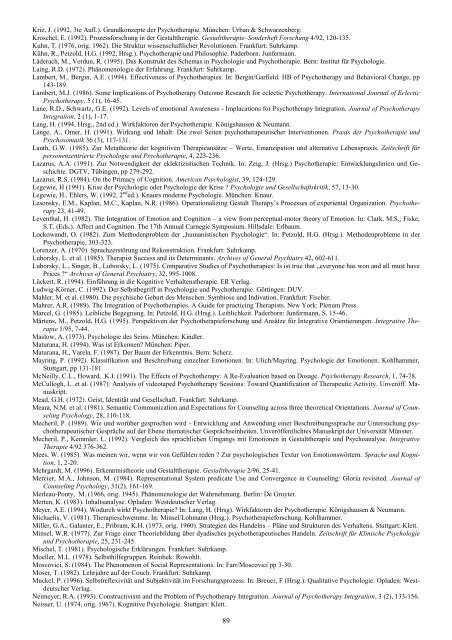Psychotherapeutische Modelle und ihre Wirkfaktoren - Schlussteil
Psychotherapeutische Modelle und ihre Wirkfaktoren - Schlussteil
Psychotherapeutische Modelle und ihre Wirkfaktoren - Schlussteil
Sie wollen auch ein ePaper? Erhöhen Sie die Reichweite Ihrer Titel.
YUMPU macht aus Druck-PDFs automatisch weboptimierte ePaper, die Google liebt.
Kriz, J. (1992, 3te Aufl.). Gr<strong>und</strong>konzepte der Psychotherapie. München: Urban & Schwarzenberg.<br />
Kroschel, E. (1992). Prozessforschung in der Gestalttherapie. Gestalttherapie–Sonderheft Forschung 4/92, 120-135.<br />
Kuhn, T. (1976, orig. 1962). Die Struktur wissenschaftlicher Revolutionen. Frankfurt: Suhrkamp.<br />
Kühn, R., Petzold, H.G. (1992, Hrsg.). Psychotherapie <strong>und</strong> Philosophie. Paderborn: Junfermann.<br />
Läderach, M., Verdun, R. (1995). Das Konstrukt des Schemas in Psychologie <strong>und</strong> Psychotherapie. Bern: Institut für Psychologie.<br />
Laing, R.D. (1972). Phänomenologie der Erfahrung. Frankfurt: Suhrkamp.<br />
Lambert, M., Bergin, A.E. (1994). Effectiveness of Psychotherapies. In: Bergin/Garfield. HB of Psychotherapy and Behavioral Change, pp<br />
143-189.<br />
Lambert, M.J. (1986). Some Implications of Psychotherapy Outcome Research for eclectic Psychotherapy. International Journal of Eclectic<br />
Psychotherapy, 5 (1), 16-45.<br />
Lane, R.D., Schwartz, G.E. (1992). Levels of emotional Awareness - Implacations for Psychotherapy Integration. Journal of Psychotherapy<br />
Integration, 2 (1), 1-17.<br />
Lang, H. (1994, Hrsg., 2nd ed.). <strong>Wirkfaktoren</strong> der Psychotherapie. Königshausen & Neumann.<br />
Lange, A., Omer, H. (1991). Wirkung <strong>und</strong> Inhalt: Die zwei Seiten psychotherapeutischer Interventionen. Praxis der Psychotherapie <strong>und</strong><br />
Psychosomatik 36 (3), 117-131.<br />
Lauth, G.W. (1985). Zur Metatheorie der kognitiven Therapieansätze – Werte, Emanzipation <strong>und</strong> alternative Lebenspraxis. Zeitschrift für<br />
personenzentrierte Psychologie <strong>und</strong> Psychotherapie, 4, 223-236.<br />
Lazarus, A.A. (1991). Zur Notwendigkeit der eklektizistischen Technik. In: Zeig, J. (Hrsg.) Psychotherapie: Entwicklungslinien <strong>und</strong> Geschichte.<br />
DGTV, Tübingen, pp 279-292.<br />
Lazarus, R.S. (1984). On the Primacy of Cognition. American Psychologist, 39, 124-129.<br />
Legewie, H (1991). Krise der Psychologie oder Psychologie der Krise ? Psychologie <strong>und</strong> Gesellschaftskritik, 57, 13-30.<br />
Legewie, H., Ehlers, W. (1992, 2 nd ed.). Knaurs moderne Psychologie. München: Knaur.<br />
Lesonsky, E.M., Kaplan, M.C., Kaplan, N.R. (1986). Operationalizing Gestalt Therapy’s Processes of experiental Organization. Psychotherapy<br />
23, 41-49.<br />
Leventhal, H. (1982). The Integration of Emotion and Cognition – a view from perceptual-motor theory of Emotion. In: Clark, M.S.; Fiske,<br />
S.T. (Eds.). Affect and Cognition. The 17th Annual Carnegie Symposium. Hillsdale: Erlbaum.<br />
Lockowandt, O. (1982). Zum Methodenproblem der „humanistischen Psychologie“. In: Petzold, H.G. (Hrsg.). Methodenprobleme in der<br />
Psychotherapie, 303-323.<br />
Lorenzer, A. (1970). Sprachzerstörung <strong>und</strong> Rekonstruktion. Frankfurt: Suhrkamp.<br />
Luborsky, L. et al. (1985). Therapist Success and its Determinants. Archives of General Psychiatry 42, 602-611.<br />
Luborsky, L., Singer, B., Luborsky, L. (1975). Comparative Studies of Psychotherapies: Is ist true that „everyone has won and all must have<br />
Prices ?“ Archives of General Psychiatry, 32, 995-1008.<br />
Lückert, R. (1994). Einführung in die Kognitive Verhaltenstherapie. ER Verlag.<br />
Ludwig-Körner, C. (1992). Der Selbstbegriff in Psychologie <strong>und</strong> Psychotherapie. Göttingen: DUV.<br />
Mahler, M. et al. (1980). Die psychische Geburt des Menschen. Symbiose <strong>und</strong> Indivation. Frankfurt: Fischer.<br />
Mahrer, A.R. (1989). The Integration of Psychotherapies. A Guide for practicing Therapists. New York: Plenum Press.<br />
Marcel, G. (1985). Leibliche Begegnung. In: Petzold, H.G. (Hrsg.). Leiblichkeit. Paderborn: Junfermann, S. 15-46.<br />
Märtens, M., Petzold, H.G. (1995). Perspektiven der Psychotherapieforschung <strong>und</strong> Ansätze für Integrative Orientierungen. Integrative Therapie<br />
1/95, 7-44.<br />
Maslow, A. (1973). Psychologie des Seins. München: Kindler.<br />
Maturana, H. (1994). Was ist Erkennen? München: Piper.<br />
Maturana, H., Varela, F. (1987). Der Baum der Erkenntnis. Bern: Scherz.<br />
Mayring, P. (1992). Klassifikation <strong>und</strong> Beschreibung einzelner Emotionen. In: Ulich/Mayring. Psychologie der Emotionen. Kohlhammer,<br />
Stuttgart, pp 131-181.<br />
McNeilly, C.L., Howard, K.I. (1991). The Effects of Psychotherapy: A Re-Evaluation based on Dosage. Psychotherapy Research, 1, 74-78.<br />
McCullogh, L. et al. (1987). Analysis of videotaped Psychotherapy Sessions: Toward Quantification of Therapeutic Activity. Unveröff. Manuskript.<br />
Mead, G.H. (1972). Geist, Identität <strong>und</strong> Gesellschaft. Frankfurt: Suhrkamp.<br />
Meara, N.M. et al. (1981). Semantic Communication and Expectations for Counseling across three theoretical Orientations. Journal of Counseling<br />
Psychology, 28, 110-118.<br />
Mecheril, P. (1989). Wie <strong>und</strong> worüber gesprochen wird - Entwicklung <strong>und</strong> Anwendung einer Beschreibungssprache zur Untersuchung psychotherapeutischer<br />
Gespräche auf der Ebene thematischer Gesprächseinheiten. Unveröffentlichtes Manuskript der Universität Münster.<br />
Mecheril, P., Kemmler, L. (1992). Vergleich des sprachlichen Umgangs mit Emotionen in Gestalttherapie <strong>und</strong> Psychoanalyse. Integrative<br />
Therapie 4/92 376-362.<br />
Mees, W. (1985). Was meinen wir, wenn wir von Gefühlen reden ? Zur psychologischen Textur von Emotionswörtern. Sprache <strong>und</strong> Kognition,<br />
1, 2-20.<br />
Mehrgardt, M. (1996). Erkenntnistheorie <strong>und</strong> Gestalttherapie. Gestalttherapie 2/96, 25-41.<br />
Mercier, M.A., Johnson, M. (1984). Representational System predicate Use and Convergence in Counseling: Gloria revisited. Journal of<br />
Counseling Psychology, 31(2), 161-169.<br />
Merleau-Ponty, M. (1966, orig. 1945). Phänomenologie der Wahrnehmung. Berlin: De Gruyter.<br />
Merten, K. (1983). Inhaltsanalyse. Opladen: Westdeutscher Verlag.<br />
Meyer, A.E. (1994). Wodurch wirkt Psychotherapie? In: Lang, H. (Hrsg). <strong>Wirkfaktoren</strong> der Psychotherapie. Königshausen & Neumann.<br />
Michaelis, V. (1981). Therapieschwemme. In: Minsel/Lohmann (Hrsg.). Psychotherapieforschung. Kohlhammer.<br />
Miller, G.A., Galanter, E., Pribram, K.H. (1973, orig. 1960). Strategien des Handelns – Pläne <strong>und</strong> Strukturen des Verhaltens. Stuttgart: Klett.<br />
Minsel, W.R. (1977). Zur Frage einer Theoriebildung über dyadisches psychotherapeutisches Handeln. Zeitschrift für Klinische Psychologie<br />
<strong>und</strong> Psychotherapie, 25, 231-245.<br />
Mischel, T. (1981). Psychologische Erklärungen. Frankfurt: Suhrkamp.<br />
Moeller, M.L. (1978). Selbsthilfegruppen. Reinbek: Rowohlt.<br />
Moscovici, S. (1984). The Phenomenon of Social Representations. In: Farr/Moscovici pp 3-30.<br />
Moser, T. (1982). Lehrjahre auf der Couch. Frankfurt: Suhrkamp.<br />
Muckel, P. (1996). Selbstreflexivität <strong>und</strong> Subjektivität im Forschungsprozess. In: Breuer, F (Hrsg.). Qualitative Psychologie. Opladen: Westdeutscher<br />
Verlag.<br />
Neimeyer, R.A. (1993). Constructivism and the Problem of Psychotherapy Integration. Journal of Psychotherapy Integration, 3 (2), 133-156.<br />
Neisser, U. (1974, orig. 1967). Kognitive Psychologie. Stuttgart: Klett.<br />
89


